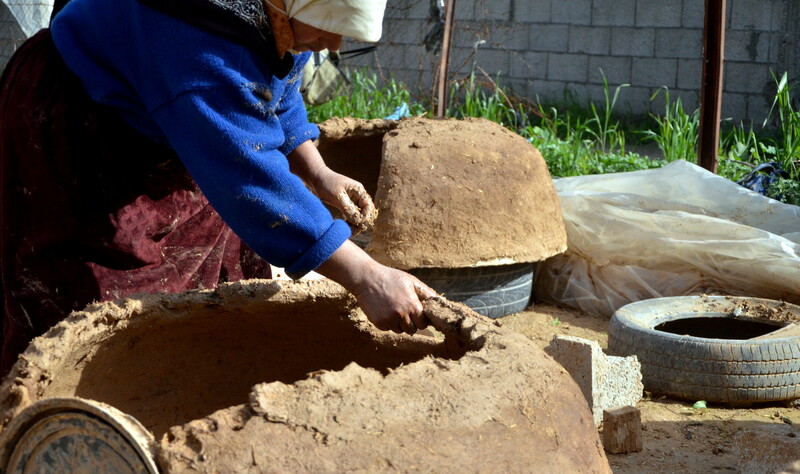The Electronic Intifada Khan Younis 19 January 2015

Nawraz Abu Jaama builds a mud stove.
Early each morning Um Atiya makes toast on a mud stove. She has become reliant on the stove since Israel’s 51-day attack on Gaza last summer. Electricity and cooking gas are scarce here in the southern Khan Younis area and throughout the Gaza Strip.
The situation has been particularly difficult in recent weeks. Gaza’s power plant was shut down on 28 December; its fuel reserves had been exhausted due to lack of funds.
Um Atiya has only had six hours of electricity per day. “We are burning some of the wood from furniture that was destroyed during the Israeli attack in our mud stove,” she said.
Nawraz Abu Jaama makes mud stoves about two kilometers from Gaza’s boundary with present-day Israel. Before last summer, she seldom sold more than three stoves per month. Now she sells between five and seven.
“These two stoves here have already been sold,” Abu Jaama said, pointing to them.
The stoves are made from mud dug from the remains of local wells. They are put together manually, with the aid of iron bars. A little cement is used to form a stove’s base.
Heavy rainfall
Gaza’s 1.8 million residents have also had to endure heavy rainfall and cold weather in recent weeks. Two babies from Khan Younis reportedly died as a result.
Many families have not been able to find proper shelter. More than 100,000 homes were damaged during Israel’s attack. Although $5.4 billion was promised at a donors’ conference for Gaza in October, aid agencies report that little reconstruction has actually taken place.
Israel has severely restricted the amount of building material allowed into Gaza. The siege of Gaza continues.
Some aid workers have estimated that the amount of material brought into Gaza during the three months after Israel’s attack was just one-third of that which entered in the three months preceding it. According to Oxfam, only 287 truckloads of materials were delivered to Gaza in November.
“Awake all night”
Ahmad Radwan, an Arabic teacher in Khan Younis, said that Huda, as the recent storm is known, was very trying for his family.
“My wife and I had to stay awake all that night in order to protect our children from the rain,” he said. “We kept clearing out the water.”
Radwan, who has seven children, lives in an apartment at the top of a three-story building. Some of the building’s walls have fallen down. Others have been left with holes.
“All of our furniture, including our blankets, have been damaged,” said his wife Lubna. “Every single part of the apartment is damaged. Even my bathroom has no walls now. When will the reconstruction start here? When?”
“We stay in front of a wood fire all the day long,” Ahmad added. “When night falls, we leave our destroyed apartment and head for my parents-in-law’s home to get some sleep. I do not know how we cope.”
Rami Almeghari is a journalist and university lecturer based in the Gaza Strip.





